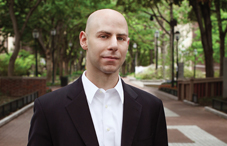In brief
Snapshots of some of the latest peer-reviewed research within psychology and related fields.
Monitor Magazine - APA
October 2013, Vol 44, No. 9
SLEEP
Black adults are more likely than white adults to skimp on sleep, and the sleep gap is especially wide for black professionals, according to a study out of the Harvard School of Public Health. Based on the results of a nationally representative survey of nearly 140,000 men and women, 29 percent of adults routinely get fewer than seven hours of sleep each night. Sleep skimping was more common among blacks in general than whites — 37 percent compared with 28 percent — but researchers found an even more noticeable difference between professionals: 42 percent of black professionals reported fewer than seven hours of sleep each night compared with 26 percent of white professionals. A sleep gap was not found among food and retail workers, and the overall racial gap was similar in men and women (American Journal of Epidemiology, online Sept. 9).
The color of your night light may affect your mood, according to a study involving hamsters conducted by psychologists at Ohio State University. The researchers exposed adult female hamsters to four weeks of nighttime conditions with either no light, dim red light, dim white light (similar to that found in normal light bulbs) or dim blue light. The hamsters that were kept in the dark at night drank the most sugar water — a treat they enjoy — followed closely by those exposed to red light. Those that lived with dim white or blue light at night drank significantly less sugar water, which the scientists say may indicate evidence of a mood problem. The researchers then examined the hippocampus of the hamsters' brains and found that those that spent the night in dim blue or white light had a significantly reduced density of dendritic spines, a condition that has been linked to depression (The Journal of Neuroscience, Aug. 7).
Soda consumption may be related to behavioral problems in young children, according to a study led by Columbia University researchers. The scientists examined data from a survey of 3,000 5-year-olds and their mothers in 20 large U.S. cities. After controlling for socio-demographic factors, researchers found any non-diet soft drink consumption by the children was associated with increased aggressive behavior. The soda-drinking children also had more attention problems than children who did not drink sodas (The Journal of Pediatrics, online Aug. 21)
Women may be happier when they gain weight, even though they are not as healthy, according to a study conducted at Helmholtz Zentrum München, the German Research Center for Environmental Health. The researchers evaluated weight-and health-related quality of life data collected from more than 3,000 people over seven years. They found that weight gain led to a deterioration in physical health among women and obese men, but the female study participants experienced improved mental quality of life as their weight increased. The findings were observed even in women who were already overweight when the study began (International Journal of Public Health, September).
Overweight, obese and lean women are equally capable of impulse control, suggests a study conducted at the University at Buffalo. In the study, which included 24 lean and 24 overweight or obese women, participants took a series of hypothetical tests that promised different amounts of money available either now or in the future. Some participants were then asked to think about future events that would occur during the time periods involved in the monetary test. For example, if they were choosing between $95 now and $100 in six months, researchers asked them to think about the most vivid event that would be happening to them in six months, such as a birthday party. A control group was asked to think about vivid scenes from a Pinocchio story they had read. The researchers found that the women who engaged in the future thinking exercise were more willing to wait for the money and that there were few differences among the lean and the overweight or obese women (Appetite, December).


